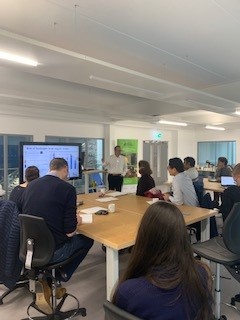Hydrogen from biowaste: a research technology development workshop

Co-created by the BECCS-BEIS funded project team and C-DICE, this bespoke workshop bought together an array of stakeholders as part of a cross-project collaboration with multiple audiences working in an interdisciplinary way.
The purpose of the event was to critically consider the technical aspects of the processes making up this complex project and evaluate and explore opportunities three key themes (technical vulnerability and resilience, techno-economic aspects, and commercialisation opportunities).
The interactive nature of the workshop allowed for diverse discussions around the technicalities of the project processes as well as capacity for augmenting/complementing existing technologies.
The variety of stakeholders including the project team, key academics, industrial partners from the water and waste sector, postdoctoral researchers, PhD students and members of the C-DICE team led to a range of discussion points, maximising the available time. These discussions benefitted all stakeholders and led to comprehensive feedback for the project team.
The day started with an overview of the technical aspects of the processes, led by academics from Aberdeen and Cranfield Universities. Professor Davide Dionisi gave an overview of the whole project, signposting the benefits of a smaller plant, meaning a lower carbon footprint. Dr Luca Alibardi expanded on this, explaining the rationale for using biological processes and the role of dark fermentation for hydrogen production other than steam gasification, due to the heat savings and less energy consumption overall.
Dr Yeshui Zhang, introduced us to functional catalysts in steam gasification, highlighting that although this can be more expensive it boosts hydrogen production. Dr Panos Kechagiopoulos outlined the non-thermal/non-equilibrium plasmas involved in this process, which utilise the relatively high energy to break bonds at lower temperatures, leading to energy efficiencies in comparison to traditional factory processes.
Kayleigh Nelson described the existing competitive market and high demand for organic waste, impacting on commercialisation opportunities. With H2 tech becoming increasingly attractive there is commercialisation potential and good alignment with current policy thinking and direction.
Following the input during the first part of the morning, groups were established to include a range of stakeholders to discuss the details, barriers, and solutions around the key themes. Discussion points were collated as part of this collaborative work and fed back to the project team after the lunch break.
Finally the benefits of the day were identified, which included positive networking opportunities, leading to potential future collaborations. Highlights of the discussions included resource availability and competition for these resources over time, discussions around quality and purification of hydrogen as well as feedstocks and products. Local and national applications were explored in greater depth and issues around transporting hydrogen discussed. Technology readiness levels of the range of processes were considered and links to other projects or existing infrastructure were explored. Scalability and economies of scale as well as energy efficiencies for each process were raised as points for further clarification.
At the end of the workshop, a tour of the Cranfield University facilities was taken up by most attendees, including the HyPER plant and the UKCRIC George Solt facility.
Dr Fatma Seyma Keskin, a C-DICE postdoctoral researcher, highlights the value of attending a workshop such as this one as a way to network and collaborate as well as raising awareness of the wider aspects of research including the techno-economic implications and commercialisation opportunities. Fatma would recommend similar workshops to other postdocs, particularly if they have an interest in expanding networks and taking their research further.
Post-workshop feedback from participants is overwhelmingly positive with noteworthy points being potential for collaborating and bridging the industry-academia gap moving forward.
If you are part of a project team and you think that a similar stakeholder event would be of value, please do get in touch with Karen Parks, Training Development Manager for C-DICE to discuss co-creation of a bespoke workshop.
karen.parks@cranfield.ac.uk